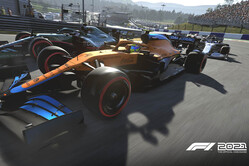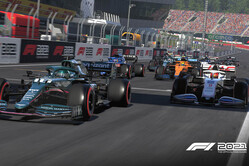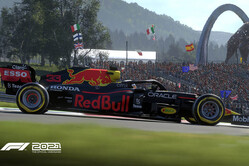


09/07/2021
NEWS STORY
 2020 was a landmark year for the Virtual Grand Prix. With many of us stuck at home and major events canceled, it was one of the few ways to keep racing alive (and people entertained!).
2020 was a landmark year for the Virtual Grand Prix. With many of us stuck at home and major events canceled, it was one of the few ways to keep racing alive (and people entertained!).
The undoubtedly positive effect of the Virtual GPs has resulted in two major award nominations. The Sports Industry Awards nominated the Virtual Grand Prix for the Virtual Event of the Year award. The award was created to recognize sports that managed to pivot quickly, responding to lockdowns by creating high-quality virtual events for fans.
The Virtual Grand Prix ticks all of the boxes. It featured eight races, all running smoothly and with a high dosage of excitement. The three so-called #Challenge events were a success, while the seven Pro Exhibition races featured the best eSports drivers on the planet. The awards ceremony is just a few months away, slated to take place in the United Kingdom on September 8.
The Drum has also nominated the Virtual Grand Prix for the Sports and Leisure award in their Marketing Awards, which takes place every year. The Drum, which has been running its award series since 2012, focuses on media and marketing. It's the first time they've paid any attention to F1.
Of course, not all attention should be given to Formula 1. The team works in partnership with Gfinity and Codemasters, and it is their tireless work that happens in the background that has made the Virtual Grand Prix possible. Working with F1 since 2017, the successful partnership deal has been extended until 2022.
 The Roots of F1's Virtual Grand Prix
The Roots of F1's Virtual Grand Prix
The Virtual Grand Prix was launched in 2020 as a result of the cancellation of the racing calendar, but what enabled organizers to make it happen has its roots in previous years.
The series used the 2019 edition of the official F1 game, which was developed by British video game agency Codemasters. The 2021 version of the game is their fourteenth in the series, meaning they have some serious experience under their belts.
The Virtual Grand Prix wasn't just conjured out of thin air, but was the result of years of hard work by dedicated developers, with the latest version of the game part of an iterative process that cannot be replicated in a single development cycle.
The company also produces other racing games, including Dirt 5 and Project Cars, which reflects their deep expertise in creating a smooth gameplay experience. If the game had been released with a range of bugs (Cyberpunk, take note!), people would have ignored the virtual GP.
The company responsible for the eSports side of the affair is Gfinity, an agency that has been working closely with Codemasters and F1 since 2017. They have been responsible for one of the most successful eSports tournaments around, and so it's no surprise they were more than ready to handle the challenge of a Virtual Grand Prix.
The result was an exciting race with plenty of future, even if lockdowns do ease and 'real' racing come back fully. With the young global audience and increasing interest, the future looks bright for space.
 Beyond F1
Beyond F1
2020 has been a big year for virtual racing, and it's not just Formula 1 that's getting in on the action. The Virtual Grand National, for example, garnered a record 4.8 viewers (as recorded by the Guardian). CGI technology combined with custom-built algorithms to show a virtual equivalent of one of the biggest races in the world.
The event was a huge success, raising a staggering $5 million for the UK's National Health Service. This was done through a collective effort on behalf of the country's bookmakers, who took bets on the event and then donated all of the profits to the NHS.
NASCAR and Indycar are also running raving events, but perhaps the most intriguing sport to join the virtual fun is camel racing. The sport is incredibly popular in the Middle East, with races that traditionally take place in the United Arab Emirates and Saudi Arabia enjoying particularly high popularity.
The success of virtual camel racing has opened up an additional avenue for fans: betting. Their inability to put wagers on physical races, the average fan's desire to place a few bets has been satiated by virtual alternatives.
The popularity of virtual camel race betting jumped so high in the region that many punters and fans can consult websites that assemble the best camel racing betting websites, along with features provided by each online venue, ranging from which graphics or banking methods are implemented, to which devices can be used with providers. Arabianbetting's camel racing page is especially interesting as they also offer information on the virtual variation of the sport. Overall, it's a pretty handy resource for both beginners and experienced punters in the region.
And the $5 million haul that was given to the NHS is a testament to the popularity that goes alongside any form of race, and it's part and parcel of the experience.
What Is the Future for Virtual Racing?
Some speculate that virtual racing will hit a peak in 2021, but will quickly fade into niche obscurity in the coming months. Once things are 'back to normal' (does anyone remember what normal is like?) and racing is up and running as we remember it, interest will wane.
However, all stats point to increasing interest in virtual events, even with the return of in-person spectator sports. With younger audiences who are tech-savvy, eSports has a big future. Sure, it may not beat traditional events just yet, but virtual races are now legitimate alternatives.